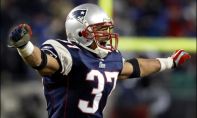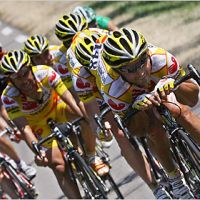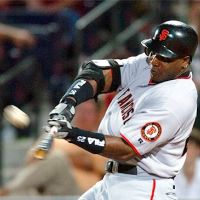- About Us
- Columns
- Letters
- Cartoons
- The Udder Limits
- Archives
- Ezy Reading Archive
- 2024 Cud Archives
- 2023 Cud Archives
- 2022 Cud Archives
- 2021 Cud Archives
- 2020 Cud Archives
- 2015-2019
- 2010-2014
- 2004-2009
 |
Ezy Reading: Looking For Truth In Empty Spaces |
The recent revelation here in the United States that New  England Patriots safety Rodney Harrison would be suspended three games for use of the banned substance human growth hormone was yet another ongoing chink in the armour of the sports figure as hero or role model undone. Though Harrison had always been known as an outspoken and aggressive athlete (some had ventured so far as to label him a dirty player in the past), his team, the Patriots, have traditionally been esteemed as a model franchise in terms of class and professionalism, and even as a haven of sorts where veteran players with troubled or controversial pasts could often go to become rehabilitated, rejuvenating their careers and at last finding major success. Just last season, with this kind of reputation in hand, several Patriots players openly condemned linebacker Shawne Merriman of the rival San Diego Chargers for his own violation of the NFL’s steroid and related substances policy. As a dedicated fan of the Patriots I myself remember reading the news of Merriman’s breach and wondering how it could be that such a drug cheat was merely suspended for four games rather than getting booted out of the league altogether. Now, when one of my own favourite players was found guilty of a similar transgression, I was disappointed by my inclination to apply a different standard to his mistake, even as the news solidified the fact that no-one is untouchable these days from scandal in sport, not even our most beloved idols.
England Patriots safety Rodney Harrison would be suspended three games for use of the banned substance human growth hormone was yet another ongoing chink in the armour of the sports figure as hero or role model undone. Though Harrison had always been known as an outspoken and aggressive athlete (some had ventured so far as to label him a dirty player in the past), his team, the Patriots, have traditionally been esteemed as a model franchise in terms of class and professionalism, and even as a haven of sorts where veteran players with troubled or controversial pasts could often go to become rehabilitated, rejuvenating their careers and at last finding major success. Just last season, with this kind of reputation in hand, several Patriots players openly condemned linebacker Shawne Merriman of the rival San Diego Chargers for his own violation of the NFL’s steroid and related substances policy. As a dedicated fan of the Patriots I myself remember reading the news of Merriman’s breach and wondering how it could be that such a drug cheat was merely suspended for four games rather than getting booted out of the league altogether. Now, when one of my own favourite players was found guilty of a similar transgression, I was disappointed by my inclination to apply a different standard to his mistake, even as the news solidified the fact that no-one is untouchable these days from scandal in sport, not even our most beloved idols.
 Obviously scandal in sports is nothing new- the Chicago Black Sox scandal of 1919 and the rumours surrounding Babe Ruth’s ‘extra-curricular activities’ are famous. More recently, however, it seems the bad news has been rushing out of the floodgates all at once rather than just occasionally appearing in our line of sight. Between the ongoing Barry Bonds saga, a Tour de France race that no longer can claim credibility, Michael Vick’s dog-fighting scandal, Andrew Johns drug revelations back in Australia and beyond, you could make a strong case that the classic notion of a role model in sports is long dead. But why should people look to the sporting arena for their heroes anyway? After all, these athletes are only human beings, prone to the same mistakes and missteps of judgement as you or I, yet often multiplied a thousand times given the added temptations and risks involved in their lifestyles, as well as an ever-present media spotlight of attention just waiting for mistakes to happen that they might grace the next day’s tabloid front page. Sure, there’s an argument can be made that individuals under
Obviously scandal in sports is nothing new- the Chicago Black Sox scandal of 1919 and the rumours surrounding Babe Ruth’s ‘extra-curricular activities’ are famous. More recently, however, it seems the bad news has been rushing out of the floodgates all at once rather than just occasionally appearing in our line of sight. Between the ongoing Barry Bonds saga, a Tour de France race that no longer can claim credibility, Michael Vick’s dog-fighting scandal, Andrew Johns drug revelations back in Australia and beyond, you could make a strong case that the classic notion of a role model in sports is long dead. But why should people look to the sporting arena for their heroes anyway? After all, these athletes are only human beings, prone to the same mistakes and missteps of judgement as you or I, yet often multiplied a thousand times given the added temptations and risks involved in their lifestyles, as well as an ever-present media spotlight of attention just waiting for mistakes to happen that they might grace the next day’s tabloid front page. Sure, there’s an argument can be made that individuals under  such a spotlight bear some sort of responsibility to at least recognize the influence they might have upon others and keep it in mind as they go about their business. And the rules of these athlete’s sports regarding drug and other breaches are clear, no matter how prevalent illegal practices have become.
such a spotlight bear some sort of responsibility to at least recognize the influence they might have upon others and keep it in mind as they go about their business. And the rules of these athlete’s sports regarding drug and other breaches are clear, no matter how prevalent illegal practices have become.
At the same time, even as there are solid role models that exist in sports today –arguably far more than the troubled exceptions we always hear about- it’s more a cause for worry than anything else that some people depend on the sporting arena for the examples by which to lead their lives, isn’t it? Ditto the entertainment field and the three-headed monster that is Britney-Paris-Lindsay which prompted one young elementary-schooler I recently overheard in a shopping mall to declare to her friend, “When I grow up I wanna’ get a tattoo right above my ass, just like Britney”. She couldn’t have been twelve yet. Now don’t get me wrong, this isn’t some sort of hyper-conservative, semi-evangelical thesis, it’s just a matter of common sense. If you really are dependent upon finding a true hero in life on a freaking football field and an athlete who earns $30 million a year, then don’t cry foul when things go sour. You pretty much deserved your disappointment and shattered expectations.
So  where can you turn for one’s heroes or role models? Don’t ask me, for I’m not qualified nor am I conceited enough to answer that. Some find their guidance through religion, others in philosophy, and others in the aid of expensive self-help gurus. Many look within their own family or circle of friends. Others still use their own conscience as a prevailing moral guide and worry less about the opinion of actor, athlete, priest or politician, or at least factor in some of their model and opinions without being pushed wholly in one particular direction alone. Either way, heroes and role models will always vary from one individual to the next, and certainly vary because of changing cultural norms one year to the next- Hegel’s ‘Zeitgeist’. Just that common sense might prevail above all else -in the interests of avoiding we think steroids, dog-fighting and no panties in public are good things to live by- that here is all I ask and ask again.
where can you turn for one’s heroes or role models? Don’t ask me, for I’m not qualified nor am I conceited enough to answer that. Some find their guidance through religion, others in philosophy, and others in the aid of expensive self-help gurus. Many look within their own family or circle of friends. Others still use their own conscience as a prevailing moral guide and worry less about the opinion of actor, athlete, priest or politician, or at least factor in some of their model and opinions without being pushed wholly in one particular direction alone. Either way, heroes and role models will always vary from one individual to the next, and certainly vary because of changing cultural norms one year to the next- Hegel’s ‘Zeitgeist’. Just that common sense might prevail above all else -in the interests of avoiding we think steroids, dog-fighting and no panties in public are good things to live by- that here is all I ask and ask again.
Ezy Reading is out as often as can be…
Ezy Reading can be contacted at feedback@thecud.com.au, just include ‘ATTENTION: EZY READING’ in the subject line of your email.
